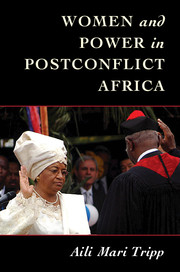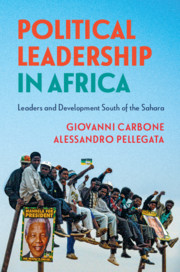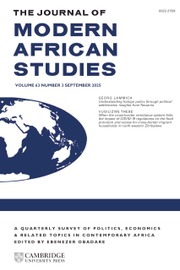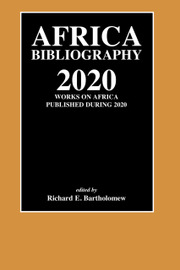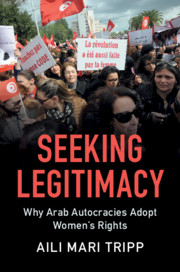Women and Power in Postconflict Africa
The book explains an unexpected consequence of the decrease in conflict in Africa after the 1990s. Analysis of cross-national data and in-depth comparisons of case studies of Uganda, Liberia and Angola show that post-conflict countries have significantly higher rates of women's political representation in legislatures and government compared with countries that have not undergone major conflict. They have also passed more legislative reforms and made more constitutional changes relating to women's rights. The study explains how and why these patterns emerged, tying these outcomes to the conjuncture of the rise of women's movements, changes in international women's rights norms and, most importantly, gender disruptions that occur during war. This book will help scholars, students, women's rights activists, international donors, policy makers, non-governmental organizations (NGOs) and others better understand some of the circumstances that are most conducive to women's rights reform today and why.
- Breaks new ground theoretically, and will inspire more research to expand, qualify or even challenge what is written
- The first book to explain why post-conflict countries have been more open to women's rights policies and representation in Africa and beyond
- Accessible to broad audiences from students, to academics, women's rights activists, donors, NGO practitioners, policy makers and others
Reviews & endorsements
"Among the most notable outcomes of civil conflicts has been the expansion of women's roles and rights, particularly in the political sphere. Studies and theories abound, but Tripp (Univ. of Wisconsin–Madison) takes them to a new level. She seeks to explain why women enjoy greater social, political, constitutional, and legislative prominence in post-conflict states and how they achieved this so quickly under difficult circumstances … Highly recommended for university and larger public library systems and collections specializing in African studies, international affairs, comparative politics, and war and peace studies."
J. P. Smaldone, Choice
'… Tripp’s book examines a decade-long pattern of high participation of women in parliament and leadership along with women’s rights policies in postconflict African countries.' Manisha Desai, Mobilization: An International Quarterly
'This book provides a rich, historical, and comparative account of the impact of women and conflicts in shaping evolving gender regimes. One of the book’s greatest strengths is its disruptions of the essentialist arguments often tied to sub-Saharan Africa via its recognition of African women’s agency in shaping their own destiny as well as international, mainstream discourses of gender equality and empowerment. … it calls for more geographic studies on development and gendered activism. Women and Power in Postconflict Africa is a powerful contribution to the scholarship on gender and development in its attention to historical and contextual analyses of women’s rights and empowerment. It also extends the literature on civil society through its attention to the heterogeneity of women’s organizing in the region and the spaces of possibilities that exist even in dire circumstances.' Oceane Jasor, H-Diplo
'Women and Power in Postconflict Africa offers an impressively rich and comprehensive picture of gender regime change in post-1990s Africa. Using case studies and cross-national analytical data, Aili Tripp’s new book provides insights into key causal processes that enable a shift in gender norms and roles in the postconflict environment, and highlights the roles that women play as agents of change in a variety of conflict, peace, and postconflict processes.' Sarah Shair-Rosenfield, Perspectives on Politics
'Tripp’s Women and Power in Post-Conflict Africa provides an impressively detailed analysis of [postconflict and gender] dynamics in Angola, Liberia, and Uganda.' Marie E. Berry and Milli Lake, Politics and Gender
'Tripp has performed a great service in pulling together a wide range of research and analysis on women and political power. In the end, she has brought us a thoughtful assessment of an issue that should be at the top of every nation’s agenda - what can be done to improve the role and influence of women in politics, not only in Africa, but around the world.' Kathleen Sheldon, African Studies Review
Product details
December 2015Adobe eBook Reader
9781316435335
0 pages
0kg
5 b/w illus. 4 maps 33 tables
This ISBN is for an eBook version which is distributed on our behalf by a third party.
Table of Contents
- Part I. Setting the Stage: Preface
- 1. Introduction
- 2. Pathways to change in political gender regimes
- Part II. Case Studies:
- 3. Uganda: forging a new trajectory
- 4. Liberia: the power of fighting for peace
- 5. Angola: the limits of post-conflict gender policy reform
- Part III. New Openings for Women's Rights:
- 6. Women's rights in peace agreements
- 7. Women's rights in post-conflict constitutions
- Part IV. Gendered Outcomes:
- 8. Women and leadership in post-conflict countries
- 9. Women's rights and post-conflict legislative reform
- Part V. Future Research:
- 10. New frontiers in the study of women, conflict, and peace.

